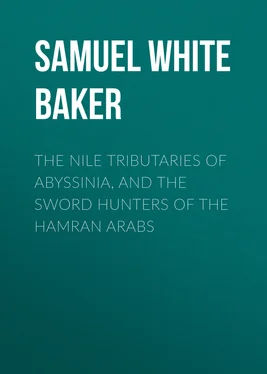Samuel White Baker - The Nile Tributaries of Abyssinia, and the Sword Hunters of the Hamran Arabs
Здесь есть возможность читать онлайн «Samuel White Baker - The Nile Tributaries of Abyssinia, and the Sword Hunters of the Hamran Arabs» — ознакомительный отрывок электронной книги совершенно бесплатно, а после прочтения отрывка купить полную версию. В некоторых случаях можно слушать аудио, скачать через торрент в формате fb2 и присутствует краткое содержание. Жанр: Путешествия и география, История, foreign_edu, foreign_antique, foreign_prose, на английском языке. Описание произведения, (предисловие) а так же отзывы посетителей доступны на портале библиотеки ЛибКат.
- Название:The Nile Tributaries of Abyssinia, and the Sword Hunters of the Hamran Arabs
- Автор:
- Жанр:
- Год:неизвестен
- ISBN:нет данных
- Рейтинг книги:3 / 5. Голосов: 1
-
Избранное:Добавить в избранное
- Отзывы:
-
Ваша оценка:
- 60
- 1
- 2
- 3
- 4
- 5
The Nile Tributaries of Abyssinia, and the Sword Hunters of the Hamran Arabs: краткое содержание, описание и аннотация
Предлагаем к чтению аннотацию, описание, краткое содержание или предисловие (зависит от того, что написал сам автор книги «The Nile Tributaries of Abyssinia, and the Sword Hunters of the Hamran Arabs»). Если вы не нашли необходимую информацию о книге — напишите в комментариях, мы постараемся отыскать её.
The Nile Tributaries of Abyssinia, and the Sword Hunters of the Hamran Arabs — читать онлайн ознакомительный отрывок
Ниже представлен текст книги, разбитый по страницам. Система сохранения места последней прочитанной страницы, позволяет с удобством читать онлайн бесплатно книгу «The Nile Tributaries of Abyssinia, and the Sword Hunters of the Hamran Arabs», без необходимости каждый раз заново искать на чём Вы остановились. Поставьте закладку, и сможете в любой момент перейти на страницу, на которой закончили чтение.
Интервал:
Закладка:
There is no divorce court among the Arabs. They are not sufficiently advanced in civilization to accept a pecuniary fine as the price of a wife's dishonour; but a stroke of the husband's sword, or a stab with the knife, is generally the ready remedy for infidelity. Although strictly Mahometans, the women are never veiled; neither do they adopt the excessive reserve assumed by the Turks and Egyptians. The Arab women are generally idle; and one of the conditions of accepting a suitor is, that a female slave is to be provided for the special use of the wife. No Arab woman will engage herself as a domestic servant; thus, so long as their present customs shall remain unchanged, slaves are creatures of necessity. Although the law of Mahomet limits the number of wives for each man to four at one time, the Arab women do not appear to restrict their husbands to this allowance, and the slaves of the establishment occupy the position of concubines.
The customs of the Arabs in almost every detail have remained unchanged. Thus, in dress, in their nomadic habits, food, the anointing with oil (Eccles. ix. 8, "Let thy garments be always white, and let thy head lack no ointment"), they retain the habits and formalities of the distant past, and the present is but the exact picture of those periods which are historically recorded in the Old Testament. The perfumery of the women already described, bears a resemblance to that prepared by Moses for the altar, which was forbidden to be used by the people. "Take thou also unto thee principal spices, of pure myrrh five hundred shekels, and of sweet cinnamon half so much, even two hundred and fifty shekels, and of sweet calamus two hundred and fifty shekels, and of cassia five hundred shekels, after the shekel of the sanctuary, and of oil olive an hin: and thou shalt make it an oil of holy ointment, an ointment compound after the art of the apothecary: it shall be an holy anointing oil."—Exod. xxx. 23-25.
The manner of anointing by the ancients is exhibited by the Arabs at the present day, who, as I have already described, make use of so large a quantity of grease at one application that, when melted, it runs down over their persons and clothes. In Ps. cxxxiii. 2, "It is like the precious ointment upon the head, that ran down upon the beard, even Aaron's beard, that went down to the skirts of his garments."
In all hot climates, oil or other fat is necessary to the skin as a protection from the sun, where the body is either naked or very thinly clad. I have frequently seen both Arabs and the negro tribes of Africa suffer great discomfort when for some days the supply of grease has been exhausted; the skin has become coarse, rough, almost scaly, and peculiarly unsightly, until the much-loved fat has been obtained, and the general appearance of smoothness has been at once restored by an active smearing. The expression in Ps. civ. 15, "And oil to make his face to shine," describes the effect that was then considered beautifying, as it is at the present time.
The Arabs generally adhere strictly to their ancient customs, independently of the comparatively recent laws established by Mahomet. Thus, concubinage is not considered a breach of morality; neither is it regarded by the legitimate wives with jealousy. They attach great importance to the laws of Moses, and to the customs of their forefathers; neither can they understand the reason for a change of habit in any respect where necessity has not suggested the reform. The Arabs are creatures of necessity; their nomadic life is compulsory, as the existence of their flocks and herds depends upon the pasturage. Thus, with the change of seasons they must change their localities, according to the presence of fodder for their cattle. Driven to and fro by the accidents of climate, the Arab has been compelled to become a wanderer; and precisely as the wild beasts of the country are driven from place to place either by the arrival of the fly, the lack of pasturage, or by the want of water, even so must the flocks of the Arab obey the law of necessity, in a country where the burning sun and total absence of rain for nine months of the year convert the green pastures into a sandy desert. The Arabs and their herds must follow the example of the wild beasts, and live as wild and wandering a life. In the absence of a fixed home, without a city, or even a village that is permanent, there can be no change of custom. There is no stimulus to competition in the style of architecture that is to endure only for a few months; no municipal laws suggest deficiencies that originate improvements. The Arab cannot halt in one spot longer than the pasturage will support his flocks; therefore his necessity is food for his beasts. The object of his life being fodder, he must wander in search of the ever-changing supply. His wants must be few, as the constant changes of encampment necessitate the transport of all his household goods; thus he reduces to a minimum the domestic furniture and utensils. No desires for strange and fresh objects excite his mind to improvement, or alter his original habits; he must limit his impedimenta, not increase them. Thus with a few necessary articles he is contented. Mats for his tent, ropes manufactured with the hair of his goats and camels, pots for carrying fat; water-jars and earthenware pots or gourd-shells for containing milk; leather water-skins for the desert, and sheep-skin bags for his clothes,—these are the requirements of the Arabs. Their patterns have never changed, but the water-jar of to-day is of the same form that was carried to the well by the women of thousands of years ago. The conversation of the Arabs is in the exact style of the Old Testament. The name of God is coupled with every trifling incident in life, and they believe in the continual action of Divine special interference. Should a famine afflict the country, it is expressed in the stern language of the Bible—"The Lord has sent a grievous famine upon the land;" or, "The Lord called for a famine, and it came upon the land." Should their cattle fall sick, it is considered to be an affliction by Divine command; or should the flocks prosper and multiply particularly during one season, the prosperity is attributed to special interference. Nothing can happen in the usual routine of daily life without a direct connexion with the hand of God, according to the Arab's belief.
This striking similarity to the descriptions of the Old Testament is exceedingly interesting to a traveller when residing among these curious and original people. With the Bible in one hand, and these unchanged tribes before the eyes, there is a thrilling illustration of the sacred record; the past becomes the present; the veil of three thousand years is raised, and the living picture is a witness to the exactness of the historical description. At the same time, there is a light thrown upon many obscure passages in the Old Testament by the experience of the present customs and figures of speech of the Arabs which are precisely those that were practised at the periods described. I do not attempt to enter upon a theological treatise, therefore it is unnecessary to allude specially to these particular points. The sudden and desolating arrival of a flight of locusts, the plague, or any other unforeseen calamity, is attributed to the anger of God, and is believed to be an infliction of punishment upon the people thus visited, precisely as the plagues of Egypt were specially inflicted upon Pharaoh and the Egyptians.
Should the present history of the country be written by an Arab scribe, the style of the description would be purely that of the Old Testament; and the various calamities or the good fortunes that have in the course of nature befallen both the tribes and individuals, would be recounted either as special visitations of Divine wrath, or blessings for good deeds performed. If in a dream a particular course of action is suggested, the Arab believes that God has spoken and directed him. The Arab scribe or historian would describe the event as the "voice of the Lord" ("kallam el Allah"), having spoken unto the person; or, that God appeared to him in a dream and "said," &c. Thus much allowance would be necessary on the part of a European reader for the figurative ideas and expressions of the people. As the Arabs are unchanged, the theological opinions which they now hold are the same as those which prevailed in remote ages, with the simple addition of their belief in Mahomet as the Prophet.
Читать дальшеИнтервал:
Закладка:
Похожие книги на «The Nile Tributaries of Abyssinia, and the Sword Hunters of the Hamran Arabs»
Представляем Вашему вниманию похожие книги на «The Nile Tributaries of Abyssinia, and the Sword Hunters of the Hamran Arabs» списком для выбора. Мы отобрали схожую по названию и смыслу литературу в надежде предоставить читателям больше вариантов отыскать новые, интересные, ещё непрочитанные произведения.
Обсуждение, отзывы о книге «The Nile Tributaries of Abyssinia, and the Sword Hunters of the Hamran Arabs» и просто собственные мнения читателей. Оставьте ваши комментарии, напишите, что Вы думаете о произведении, его смысле или главных героях. Укажите что конкретно понравилось, а что нет, и почему Вы так считаете.












